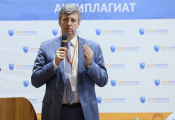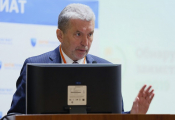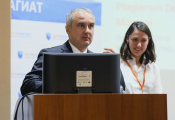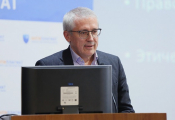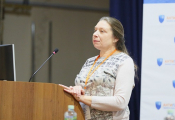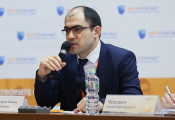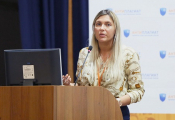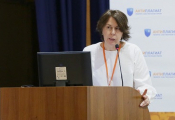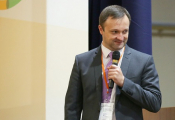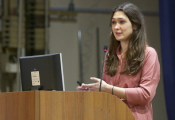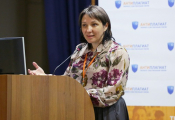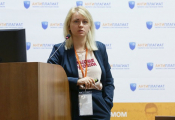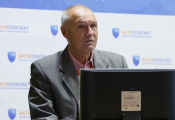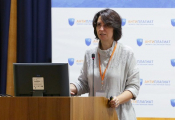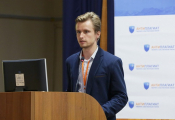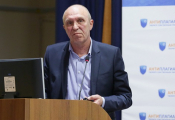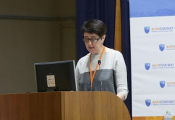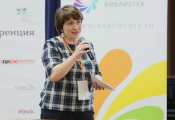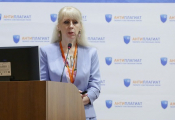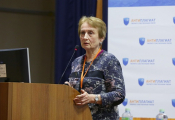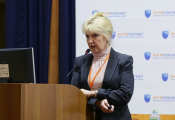International Research and Practical Conference ”Obnaruzheniye Zaimstvovaniy 2019“ (“Revealing Plagiarisms 2019”)
01.11.2019
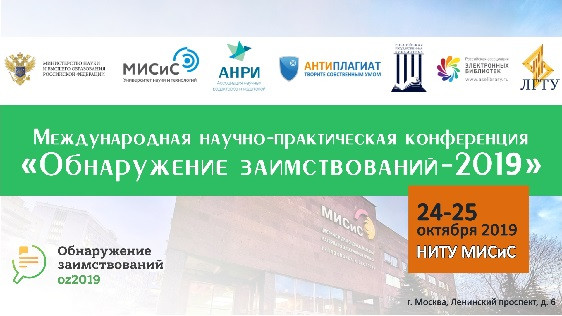 |
The international research and practical conference “Revealing Plagiarisms 2019” which took place 24-25 October at the National University of Science and Technology “MISIS” gathered scientists, publishers, editors, librarians and professionals dealing with management of research and education establishments. Traditionally, the conference was devoted to the problems of plagiarism and text recycling. Among other matters to be discussed there were methods and experience of plagiarism detection, implementation and usage of the specially developed software products and the ethical entanglements. The cumulated practices were discussed through the examples from the research, educational and publishing fields. The speakers as well as the audience paid their particular attention to the problems in the sphere of academic writing, and even more thoroughly they were considering the experiences of solving those problems in organizational, ethical, legal and educational contests. As expected, other related issues were touched upon.
The first speakers to greet the audience were Aleksey L. Semionov, the academician of the Russian Academy of Science and the Russian Academy of Education, Alexander I. Visly, deputy director general of FSFI RSL, and Оlga V. Kirillova, the president of the Association of Science Editors and Publishers. They were followed by Nina V. Avdeeva, head of the Administrative department of management and monitoring service for clients of FSFI RSL and IT director of the Russian Association of Digital Libraries, and Kanatbek Azis, deputy chair of the Higher Attestation Committee of the Kyrgyz Republic. Almost all the greeting speeches alluded to the main principles of setting the right proportions for the technical capabilities of programme complexes and human ability to think rationally, for plagiarism in research publications could not only be discussed with the aim of developing new algorithms for purely technical problems. The philosophical matter such as ‘digital ethics’ of research paper principles development was also to be recognized.
The plenary meeting of the conference was started by Yuri V. Chekhovich, the executive director of the “Antiplagiat” company, with his speech “Modern problems of plagiarism detection in Russia and abroad”. He pointed out that the contemporary technologies were prompting the process of plagiarism detection to a new level. Still the analysis of the local acts of higher education establishments and plagiarism revealing practices exposed quite a range of problems among which there was lack of changes in legislation, underestimation of the role of experts well qualified to evaluate not only the quantity of overlapping fragments, but their nature as well. Finally, the performance of the existing software products turned out to be not efficient enough to meet all the users’ demands. The report contained the results of the survey which had been carried out by the “Antiplagiat” company in collaboration with the Association of Science Editors and Publishers (ANRI).
The problems of developing an adequate text collection for optimal precise authenticity tests were dealt with in speech “The RAS scientific journals as a base for revealing plagiarisms” by Alexander I. Visly, deputy director general of FSFI RSL. The speaker brought to light the fact that a considerable part of academic journals would not transfer their full texts of articles for the RSL collection, the logical consequence of which fact was getting the test base less and less representative. A possible solution for the problem was seen in introducing the mechanism like that one used for developing the dissertation collection. Special regulation made it a must to transfer electronic copies of all the dissertation theses defended to the RSL collections. If obeyed, the laws could contribute to significant improvement of the base for plagiarism tests.
The experience of the “Elsevier” company, which was a world largest publisher of scientific and technical and medical literature, was reported by Mihail Grecea, the publication ethics expert. His speech “Plagiarism detection: challenges, resources and perspectives” was devoted to the standards of informing authors and plagiarism prevention and detection. Mr Grecea spoke on scientific publication policy. A point of the speaker’s particular attention was the online system specially implemented to enable authors study rules for submitting their works, as well as to scrutinize other ethical and organizational matters.
Thematic session “Problems of plagiarism and quoting in research and educational papers” touched upon urgent issues, such as proportion of quality and quantity of publications, demands for high publication activity rates for scientists and teachers with the along going decrease of quality of the materials. One of the session speakers figuratively characterized this phenomenon as “publication environment pollution” (Vladimir M. Prudnikov, LLC “The ‘INFRA M’ Scientific and Publishing Centre”).
The following speeches were made within the framework of the session: “What does it mean to be an author, and how should we explain that” (Konstantin P. Kokarev, the Russian Presidential Academy of National Economy and Public Administration), “Overlapping in science and education – an editor’s view” (Vladimir M. Prudnikov), “Self - quoting. To be or not to be, that is the question…” (Irina V. Sus, Nina V. Avdeeva, FSFI RSL).
The live discussion was generated by Irina V. Sus’s report reflecting the position of FSFI RSL concerning self-quoting and text recycling for scientific works. As a certain answer there sounded Elvin S. Teimurov’s report (Kutafin Moscow State Law University, MSAL) in which the speaker pointed out at the dilemma, for one could not avoid self-quoting when writing a dissertation thesis (due to the requirements set by the Higher Attestation Committee under the Ministry of Education and Science of the Russian Federation) enclosing their main research achievements. Still if the plagiarism test results were treated too directly, the software-detected overlapping fragments could be a threat for the dissertator. In her turn, Nina V. Avdeeva emphasized the importance of the human factor when taking a decision concerning the dissertation text to be considered authentic or plagiaristic. Another disputable aspect turned out to be author’s impact when co-authorship cases were concerned.
The problem attracting editors’ attention was raised in speech “From preprint to the article: self – plagiarism or scientific communication tool?” (Alina O. Zhuk, Оksana O. Medvedeva, the Russian Presidential Academy of National Economy and Public Administration). The topic covered the process of forming editorial policy towards the material which had already been put onto repository websites as a preprint, and which was to be published in reviewed journals. In his turn, Mihail Grecea, a representative of the “Elsevier” company, specified that the Western practices tended not to consider preprints, dissertation theses and often even conference materials to be fully-fledged publications, and that was the reason their presence on the Internet did not provide sufficient grounds to deny the material as the already-published one.
The Second thematic session “Methods and practices of plagiarism detection” was devoted to a wide circle of problems of the criteria of authorship and editorial evaluation of publications. Alla N. Artsishevskaya (the Russian Presidential Academy of National Economy and Public Administration) in her speech “Dishonest practices of scientific editions – labeling or digging deeper?” gave recommendations for authors which would help to identify journals using unfair strategies of publishing business.
Diverse interpretations of authorship were reflected in speeches “Modern methods of unfair authorship detection and prevention” (Vadim N. Gureev and Nikolai A. Mazov, Trofimuk Institute of Petroleum Geology and Geophysics, Siberian Branch of the Russian Academy of Sciences), “Authenticity vs Responsibility” (Marina A. Sternina and Iosif A. Sternin, Voronezh State University), “Dealing with intellectual property and plagiarism detection as a key competence of the specialist of digital economics” (Pavel Kh. Katabai, Plekhanov Russian University of Economics). Vadim N. Gureev explained the necessity of fractional accounting of each author’s impact into co-authorship works and presented his typology of unfair authorship. Marina A. Sternina proclaimed that an article could be not original still it would remain authentic, for articles close in theme and contents could be published as authentic ones due to their diverse kinds of target audiences.
The problems of practical implementation of the plagiarism detection policy in educational establishments were dealt with in the following speeches: “Practical aspects of integration of internal information systems of higher education establishments with plagiarism detecting services (with the example of integration of the “ Avtor-VUZ” (“Author – Higher Education Establishment”) system of educational processes automation with the system of automated plagiarism detection)” (Denis S. Tareev, “MT GROUP” company); “Electronic scientific platforms and problems of authenticity – possible consequences of the open access phenomenon” (Nataliya D. Trishchenko, the Association of Science Editors and Publishers of Lomonosov Moscow State University). Detailed analysis of procedural and problem aspects of organization of the plagiarism detecting systems provoked the audience’s live interest.
A certain conceptual conclusion of the thematic session turned out to be the speech by Nataliya N. Pachina (Lipetsk State Technical University) “Prospects of the development of the plagiarism detecting system” which specified the semantic field of authorship and text recycling.
The first day of the conference was crowned by discussion “We are waiting for changes, or Whether everything is handed to us” formatted as a “World Café” meeting.
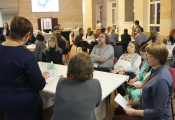 |
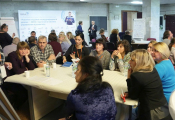 |
|
Participants of discussion
|
“We are whaiting for changes, or
|
|
Whether everything
|
is handed to us”
|
The second day of conference meetings was launched by thematic session “Ethical and methodological problems of plagiarism detection”.
Anna V. Zolkina, head of the Educational information technologies department of the National University of Science and Technology "MISIS", presented her speech “Antiplagiat in MISIS – our experience of final qualifying work expertise”. Quite resonate turned out to be the author’s report on the common practice of the MISIS which demanded a 5 – time plagiarism test for all the academic works prepared (as a rule, higher education establishments tended to carry out tests twice or three times for one and the same paper). Ms Zolkina considered it necessary to teach students to be ready for having their works tested the earlier the better, even from their first year of studies.
The professor of Moscow Polytechnic University Ivan K. Kornilov presented his speech “Plagiarism in scientific and student works – ethical and social problems”.
After that there was held roundtable “Detoxification of scientific publications – toxic authors, editors and reviewers and several ways out”. Among the participants of the event there were the following people:
– Andrei A. Rostovtsev, doctor of Physics and Mathematics, professor, the founding father of the “Dissernet” free online community, with his report “Toxic authors”;
– Аnna V. Kuleshova, executive editor of the “Monitoring of Public Opinion: Economic and Social Changes” journal (VCIOM), chair of the ASEP Council (the Council of the Association of Science Editors and Publishers) in ethics of scientific publications, with her speech “Toxic editors and reviewers”;
– Artem A. Kosmarsky, deputy director of the Laboratory of block-chain research in education and science of State Academic University for Humanities, researcher of the Institute of Oriental Studies of the Russian Academy of Sciences, publicist of the “Indicator.ru” portal, with his speech “Help instead of punishment – reviewing as a service for the scientific community”;
– Olga V. Kirillova, candidate of Technical Sciences, the ASEP president, with her speech “Detoxification of scientific publications”;
– Victor A. Glukhov, deputy director general of the “eLibrary.ru” research digital library, with his speech “The project of the Russian Science Citation Index for placing reviews”;
– Aleksei D. Voskresensky, the director of the Centre for Comprehensive Chinese Studies and Regional Projects of the MGIMO University, chief editor of the “Comparative Politics” journal, professor, doctor of Political Science, PhD (the University of Manchester), with his speech “Difficulties of methodological expertise of new knowledge and plagiarism in social studies and the humanities (ethical issues, establishing the authenticity percent, self – plagiarism and text recycling) as a source of discrepancy”.
During the roundtable, the participants of the discussions agreed to consider a ‘toxic author’ to be an author writing with a large number of co-authors. The raise of number of his/her publications would often be attained by means of submitting their works to minor journals and through publishing the translations in foreign journals. Such authors would not disregard inviting numerous co-authors and cheating with references and attribution. In their exchange of opinions, the speakers pointed out that one of the causes of low quality of publications was a financial component.
Anna V. Kuleshova reported that reviewers and editors would often be wrong with their decisions. Thus, 2,500 scientific publications had been rejected through doubtful faults of their authors’. Being a chair of the Council in ethics of scientific publications, Ms Kuleshova advised to address to their organization in disputable situations.
The analyst of the Centre for applied analysis of the Higher School of Economics — National Research University, Kirill Ivanov spoke on the practice of network analysis when carrying out plagiarism tests. The tests of the HSE were realized with usage of the full-text database: there were analyzed not only the text of the article, but all the documents alluded to within it.
Victor A. Glukhov spoke on the stricter requirements for scientific publications and changes in the very approach towards the evaluation of text authenticity. He mentioned the fact of the 400 journals being excluded from the Russian Science Citation Index.
Aleksei D. Voskresensky examined the difference in approaches towards scientists’ qualification in Russia and abroad. The speaker offered to introduce an obligatory course of ethics into the educational process.
An issue for hot discussions turned out to be the question of the expert’s role in plagiarism tests and of the applied criteria of the so-called ‘threshold levels’ of text authenticity in diverse spheres (the scientific one, the educational and the publishing sphere were analyzed). Still the conference participants would agree that with the development of the specialized software for testing texts, the expert’s role had to become more and more significant. While everyone considered plagiarism unacceptable for academic works (be that students' or scientists' cheating), there remained certain peculiarities of the procedure of plagiarism-testing in different fields of activity.
One more event to be mentioned was thematic session “Experience of implementation and practical usage of plagiarism-detecting software in scientific, publishing and educational spheres”.
The speech to open the session was made by Rimma A. Muravitskaya, head of the department of State Centre "Belarus Agricultural Library n.a. I.S.Lupinovich" of the National Academy of Sciences of Belarus. “The ‘Antiplagiat’ software – implementation and usage in the agrarian science of Belarus” was devoted to the experience of the library in plagiarism detection. Since the year of 2016, the library had been providing the service of plagiarism detection in academic texts. The overall number of the works tested counted 680 documents for the moment of speaking. Ms Muravitskaya pointed out that the service was really popular with users – there were quite a number of organizations and individual customers to request for.
Olga S. Belenkaya, head of the educational and methodological centre of the “Antiplagiat” company, spoke on “The United Collection as a new quality standard of plagiarism detection”. She introduced the new product of the company assembling the collections of the Internet, dissertation database of the RSL, “eLibrary”, legal system “Garant”, the digital library system cumulative collection, patent documents, works in Medicine, translated articles and outputs of higher education institutions. Besides, there was included the module for the correct arrangement or quotations and reference lists, for commonly-used expressions, as well for the search of paraphrase units.
Irina B. Strelkova, associate professor of the Department of management and educational technologies of the Institute of the advanced training and refresher courses of the Belarus State Pedagogical University named after M. Tank, gave details on the implementation of the “Antiplagiat” software in Belarus and on the peculiarities of its usage.
Deputy director general of publishing company “World of Science” Aleksander A. Pavlov in his speech “About scientific-article authors’ tricks improving the results of plagiarism tests. Classification of the methods used within the previous 6 years, experience of detection, recommendations” described the techniques developed and practised at their organization. Those were the methods of establishing authenticity of text material – comparing the results of the test of the original text with those ones of the text recognized by OCR, studying the XML document mark up, and exporting the manuscript to the HTML and its analysis.
Olga M. Korchazhkina, candidate of Technical Sciences, senior researcher of the Institute of Cybernetics and Educational Informatics of the “Informatics and Management” Federal Research Centre of the Russian Academy of Sciences, represented the authors’ community in reporting “Evaluating publication activity of a research scientist”. Ms Korchazhkina gave recommendation on how to arrange quotations in research works (direct and indirect quoting, secondary citation, alluding to while making surveys, references, notes, etc.) which could broaden the authors’ capabilities in text-recycling. She would also point out that such a well-known phenomenon as the h-index could not be applied when evaluating a short-term period. After that the speaker gave a detailed report on the developed and implemented at the institute methodology of evaluation of researcher’s activity and on the usage of the quantity of articles marked with the DOI index of the international search system when assessing an author’s publication activity.
Irina B. Korotkina, associate professor, doctor of Pedagogy, the director of the Centre of Academic Writing and Communication of the Russian Presidential Academy of National Economy and Public Administration, presented course “Science and publication writing”. It demonstrated the main stages and methods of developing a scientific article which would include writing techniques, title and annotation making, the scientific text-styling and the creation of the very text of the work. The speaker described in details the process of article-producing and gave certain pieces of advice about it. The aspects she chose to point out were the idea-generation, primacy of the annotation with regard to the text, the significance of the accuracy in translation into the foreign language and text-structuring.
To terminate the conference, there took place thematic session “Innovative technologies and services forming the information and educational environment”. Among the speakers there were the following ones:
– Maksim I. Mitrofanov, head of partner programmes of NPP “NEICON” with a report on the product of the company (the “Elpub” platform) and its capabilities of correlation with the “Antiplagiat” software;
– Victor А. Kuntsev, information security engineer of the National Research University of Electronic Technology (MIET), with a detailed analysis of technical problems of plagiarism-tests and of information security threats, as well as of breaching copyright cases, changing author’s text, substitution of authorship, etc.;
– Maksim P. Sushentsev, head of the sales department of LLC “VIM INGh”.
Finally, Nina V. Avdeeva summed up the results of the conference and reported its online statistics. The first day of the conference meetings registered 1,000 remote users’ connections, the second conference day witnessed 800 connections.
The Russian Association of Digital Libraries organized and carried out the internet broadcasts of the conference events on its official website www.aselibrary.ru. You are welcome to view the following materials:
· 24.10.19, the first day of the conference meetings: http://www.aselibrary.ru/video/conference43/conference438818/;
· 25.10.19, the second day of the conference: http://www.aselibrary.ru/video/conference43/conference438823/.


 Virtual Keyboard
Virtual Keyboard
 по-русски
по-русски

